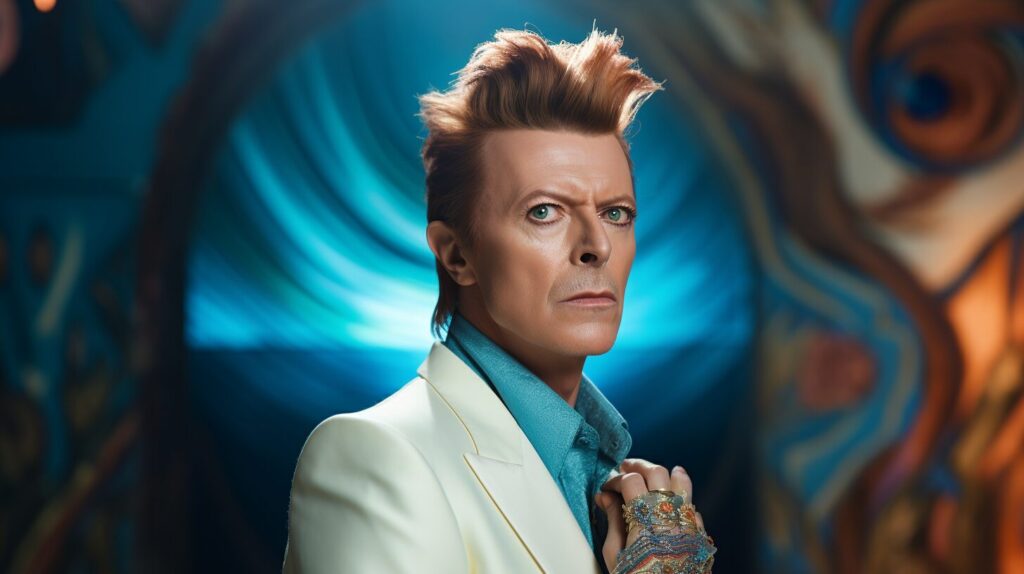Welcome to a journey through the cosmos of music, where we’ll unravel the enigmatic tapestry of “Life on Mars?” by the legendary David Bowie. In this sonic odyssey, we’ll venture deep into the heart of a song that has captured the imaginations of generations, transcending the boundaries of time and genre.
“Life on Mars?” is not just a song; it’s a cosmic query, an exploration of existence, and a testament to the boundless creativity of its creator. Join us as we dissect its lyrical riddles, dissect its musical complexities, and dive into the compelling story of its composer. Along the way, we’ll explore Bowie’s persona, the song’s chart-topping success, and its enduring influence on the world of music.
Whether you’re a devoted Bowie aficionado or a casual listener, this journey promises to be an engaging and enlightening one. So, fasten your seatbelts, as we embark on a voyage through the stardust of “Life on Mars?” and discover the cosmic legacy it has left behind.
David Bowie: Crafting a Legacy with ‘Life on Mars?’
David Bowie’s ‘Life on Mars?’ stands as a testament to his artistic genius, capturing the essence of an era while forging a timeless connection with listeners. Born from a blend of personal reflection and musical innovation, this song encapsulates Bowie’s journey from a curious youth to a visionary artist, whose collaborations and creative process continue to inspire.
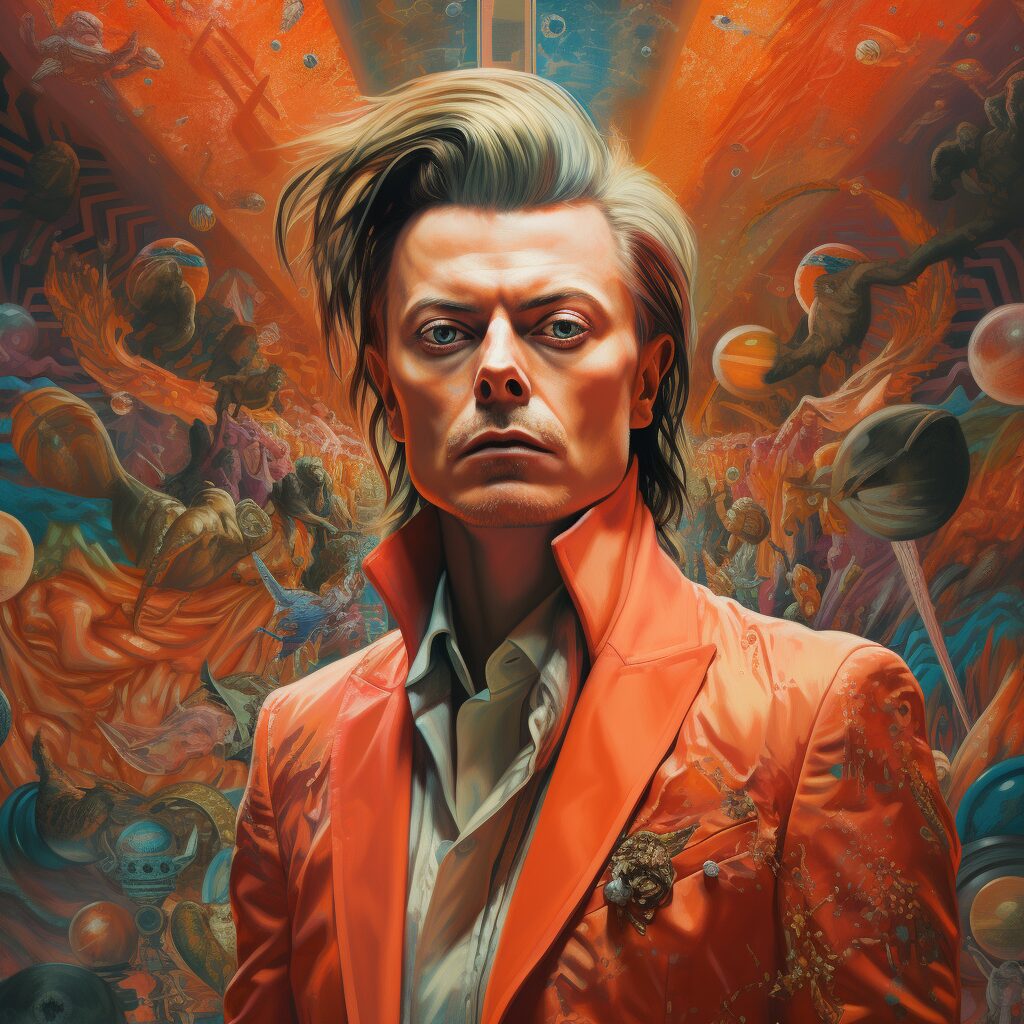 David Bowie, an artist whose name is synonymous with innovation, transformation, and the uncanny ability to transcend musical genres, left an indelible mark on the world of music with his enigmatic masterpiece “Life on Mars?”. This song, nestled within the eclectic and groundbreaking album “Hunky Dory,” stands as a beacon of Bowie’s unique artistry and his penchant for blending the avant-garde with mainstream appeal.
David Bowie, an artist whose name is synonymous with innovation, transformation, and the uncanny ability to transcend musical genres, left an indelible mark on the world of music with his enigmatic masterpiece “Life on Mars?”. This song, nestled within the eclectic and groundbreaking album “Hunky Dory,” stands as a beacon of Bowie’s unique artistry and his penchant for blending the avant-garde with mainstream appeal.
Born in London in 1947, Bowie’s early life was a crucible of artistic exploration, setting the stage for a career that would defy norms and shatter expectations. From his formative years, Bowie was drawn to the fringes of the music scene, experimenting with various styles and personas, each more daring than the last. His journey from a saxophone-loving teenager to a global music icon is a testament to his relentless pursuit of artistic authenticity.
“Life on Mars?” emerged during a pivotal era in Bowie’s career, a time when he was fervently exploring themes of alienation, fantasy, and existential inquiry. The song, with its sweeping orchestral arrangement and surreal lyrics, captures the zeitgeist of the early ’70s, a period rife with social and cultural upheaval. Bowie, ever the astute observer of the human condition, distilled this tumult into a song that questions, provokes, and ultimately transcends.
The creation of “Life on Mars?” is a tale of inspiration, frustration, and serendipity. Initially sparked by Bowie’s encounter with the French song “Comme d’habitude,” which would later become the iconic “My Way” in the hands of Frank Sinatra, Bowie set out to craft a response that was both homage and challenge. The song’s genesis was also influenced by his collaboration with other artists, notably the legendary pianist Rick Wakeman, whose contributions imbued the track with its distinctive, cinematic quality.
At the time of its release, “Life on Mars?” was more than just a song; it was a statement. Amid the glam rock surge and the shifting sands of the music industry, Bowie’s creation stood out for its depth, complexity, and emotional resonance. The initial reception was one of awe and intrigue, with fans and critics alike grappling with its layered meanings and lush, orchestral soundscapes.
In reflecting on “Life on Mars?”, it’s crucial to consider the collective genius that brought it to life. Mick Ronson’s string arrangements, Trevor Bolder’s bass lines, and Mick Woodmansey’s percussion laid the foundation upon which Bowie’s vision was realized. This collaborative spirit was a hallmark of Bowie’s approach, allowing him to transcend the conventional boundaries of rock music.
A Sonic Journey Beyond: The Legacy of ‘Life on Mars?’
‘Life on Mars?’ by David Bowie has transcended its era to become a cultural touchstone, celebrated through numerous covers, accolades, and appearances across media. Its legacy is a testament to Bowie’s enduring influence and the song’s universal appeal.
 David Bowie’s “Life on Mars?” has not only secured a place in the pantheon of musical masterpieces but has also inspired a multitude of artists across genres to reinterpret its magic. From its release to the present day, the song has been a canvas for creative expression, leading to an array of notable covers that pay homage to Bowie’s genius. One standout moment was when British artist Yungblud performed a captivating version of “Life on Mars?” at the A Bowie Celebration: Just For One Day event, which was later used by NASA to soundtrack the successful landing of the Perseverance Mars Rover.
David Bowie’s “Life on Mars?” has not only secured a place in the pantheon of musical masterpieces but has also inspired a multitude of artists across genres to reinterpret its magic. From its release to the present day, the song has been a canvas for creative expression, leading to an array of notable covers that pay homage to Bowie’s genius. One standout moment was when British artist Yungblud performed a captivating version of “Life on Mars?” at the A Bowie Celebration: Just For One Day event, which was later used by NASA to soundtrack the successful landing of the Perseverance Mars Rover.
The song’s influence extends far beyond these covers, making appearances in various forms of media and continuing to resonate with audiences worldwide. Its enduring appeal is a testament to Bowie’s unparalleled ability to blend profound lyrical themes with compelling musical compositions. The song’s accolades and its widespread recognition in movies, TV shows, and even video games underscore its timeless relevance and the universal themes it explores.
From orchestral renditions to rock interpretations, “Life on Mars?” has been covered by a diverse group of artists, each bringing their unique perspective to Bowie’s work. These covers range from the classical to the contemporary, illustrating the song’s versatility and its capacity to transcend musical boundaries.
The Cinematic Spectacle of ‘Life on Mars?’
The music video for ‘Life on Mars?’ stands as a visual extension of David Bowie’s artistic vision, with its minimalist yet captivating approach highlighting Bowie’s performance and the song’s emotional depth. Its enduring appeal lies in its ability to complement the song’s complexity with visual simplicity, making it an integral part of Bowie’s legacy.
 While the song “Life on Mars?” itself is a rich tapestry of surreal imagery and complex musical composition, its official music video adds yet another layer to its enigmatic allure. Directed by Mick Rock, the video features David Bowie in a striking powder blue suit, his vivid red hair juxtaposed against a simple white backdrop. This minimalist setting serves to highlight Bowie’s ethereal presence and the song’s theatrical delivery, further cementing its place in the annals of music history.
While the song “Life on Mars?” itself is a rich tapestry of surreal imagery and complex musical composition, its official music video adds yet another layer to its enigmatic allure. Directed by Mick Rock, the video features David Bowie in a striking powder blue suit, his vivid red hair juxtaposed against a simple white backdrop. This minimalist setting serves to highlight Bowie’s ethereal presence and the song’s theatrical delivery, further cementing its place in the annals of music history.
The video, much like the song, doesn’t rely on elaborate narratives or special effects but instead on Bowie’s charismatic performance and the song’s emotive power. Its simplicity is deceptive, drawing the viewer into a contemplative space where the music and the visual merge to create a singular, unforgettable experience. The focus on Bowie, with his otherworldly persona, allows the song’s lyrics and melodies to take center stage, inviting interpretations as diverse as the audience itself.
The reception of the music video was as profound as the song, contributing significantly to the song’s popularity and Bowie’s iconic status. It showcased Bowie’s ability to captivate an audience not just with his music but with his visual artistry, further blurring the lines between music, theater, and fine art. The video remains a testament to Bowie’s genius, a visual echo of a song that continues to resonate across generations.
Charting the Cosmic Odyssey: ‘Life on Mars?’
‘Life on Mars?’ traversed beyond the realms of time and space to etch its name in the annals of music history. Its chart success is a testament to Bowie’s visionary artistry and the song’s profound connection with listeners across decades.
 “Life on Mars?” by David Bowie, a track from the 1971 album “Hunky Dory,” wasn’t just a song; it was a phenomenon that solidified Bowie’s place in music history. Despite its release on the album, it wasn’t until 1973 that it was launched as a single, peaking at #3 on the official UK singles chart. This belated release, capitalizing on Bowie’s rising fame and the song’s live popularity, notably during the Ziggy Stardust shows and the Aladdin Sane Tour, marked a significant moment in Bowie’s career.
“Life on Mars?” by David Bowie, a track from the 1971 album “Hunky Dory,” wasn’t just a song; it was a phenomenon that solidified Bowie’s place in music history. Despite its release on the album, it wasn’t until 1973 that it was launched as a single, peaking at #3 on the official UK singles chart. This belated release, capitalizing on Bowie’s rising fame and the song’s live popularity, notably during the Ziggy Stardust shows and the Aladdin Sane Tour, marked a significant moment in Bowie’s career.
The song’s chart journey is notable for its longevity and resurgence. In a detailed chart run from June 2013 to April 2014, “Life on Mars?” demonstrated its timeless appeal, re-entering the charts and engaging new generations of listeners. This period highlighted the song’s enduring resonance, reflecting not just on Bowie’s genius but on the song’s universal themes and captivating melody.
To the girl with the mousy hair
But her mummy is yelling, “No”
And her daddy has told her to go
But her friend is nowhere to be seen
Now she walks through her sunken dream
To the seat with the clearest view
And she’s hooked to the silver screen
But the film is a saddening bore
For she’s lived it ten times or more
She could spit in the eyes of fools
As they ask her to focus on
Sailors fighting in the dance hall
Oh man, look at those cavemen go
It’s the freakiest show
Take a look at the lawman
Beating up the wrong guy
Oh man, wonder if he’ll ever know
He’s in the best selling show
Is there life on Mars?
It’s on America’s tortured brow
That Mickey Mouse has grown up a cow
Now the workers have struck for fame
‘Cause Lennon’s on sale again
See the mice in their million hordes
From Ibiza to the Norfolk Broads
Rule Britannia is out of bounds
To my mother, my dog, and clowns
But the film is a saddening bore
‘Cause I wrote it ten times or more
It’s about to be writ again
As I ask you to focus on
Sailors fighting in the dance hall
Oh man, look at those cavemen go
It’s the freakiest show
Take a look at the lawman
Beating up the wrong guy
Oh man, wonder if he’ll ever know
He’s in the best selling show
Is there life on Mars?
Unraveling the Lyrical Labyrinth of ‘Life on Mars?’
Through its complex imagery, existential themes, and intricate wordplay, ‘Life on Mars?’ stands as a lyrical masterpiece that challenges and intrigues. Bowie’s genius lies in his ability to craft a song that defies definitive interpretation, inviting listeners on a personal journey through the absurdity of life.
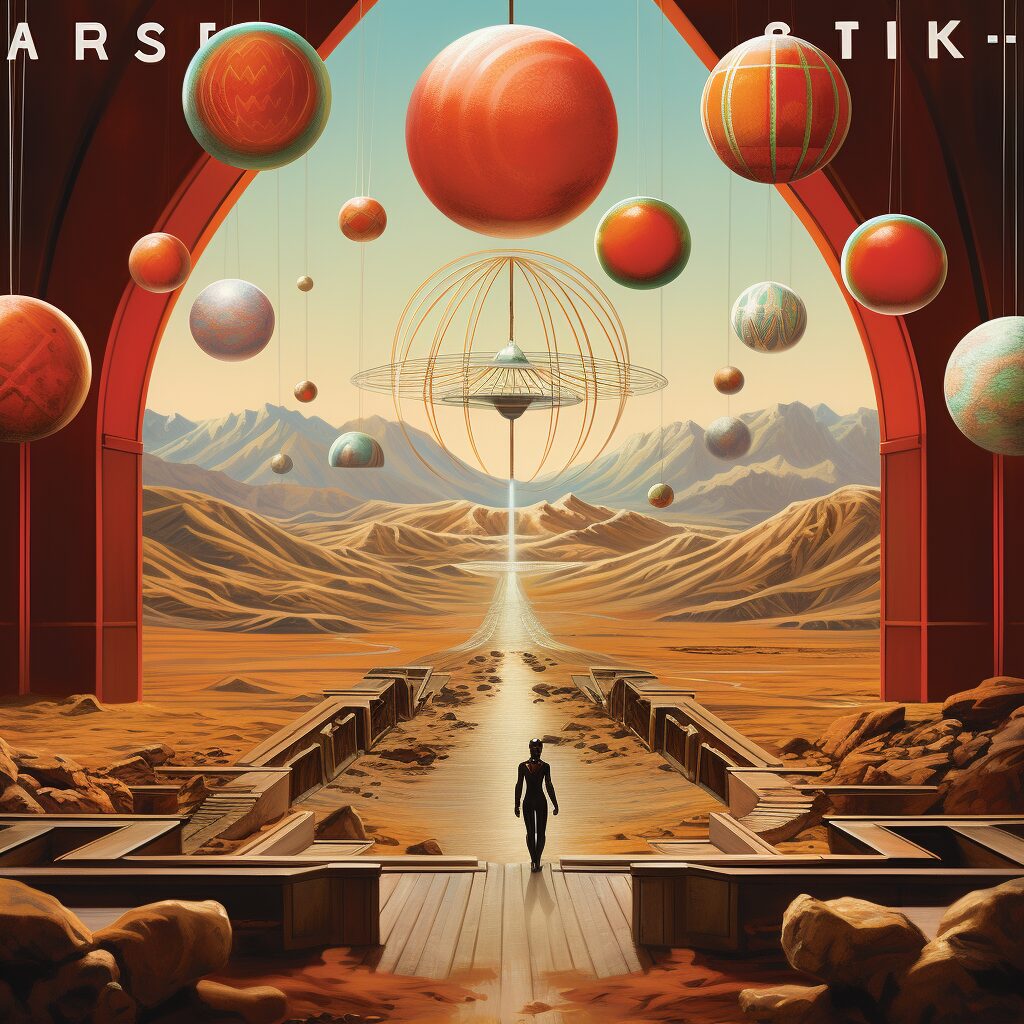 David Bowie’s “Life on Mars?” is a lyrical enigma, weaving a tapestry of vivid imagery and existential musings that have captivated listeners for decades. At its core, the song seems to ponder the absurdity of life and the escapist fantasies we entertain to cope with its mundanities. The narrative, although not linear, paints a picture of a young girl disillusioned by her reality, seeking solace in the fantastical world of cinema, only to find that the silver screen mirrors the same disheartening themes of her existence.
David Bowie’s “Life on Mars?” is a lyrical enigma, weaving a tapestry of vivid imagery and existential musings that have captivated listeners for decades. At its core, the song seems to ponder the absurdity of life and the escapist fantasies we entertain to cope with its mundanities. The narrative, although not linear, paints a picture of a young girl disillusioned by her reality, seeking solace in the fantastical world of cinema, only to find that the silver screen mirrors the same disheartening themes of her existence.
Bowie’s masterful use of literary devices, from the surreal juxtapositions to the poignant metaphors comparing real life to a movie, enhances the song’s emotional depth and complexity. The chorus, with its iconic inquiry, serves as a metaphorical quest for meaning in a seemingly indifferent universe. The song’s lyrical prowess lies in its ability to evoke a sense of wonder and existential yearning, leaving interpretations as varied as its listeners.
Culturally, “Life on Mars?” taps into the zeitgeist of its time while maintaining a timeless appeal. References to contemporary media and societal norms of the ’70s are intertwined with universal themes of alienation and disillusionment, making the song as relevant today as it was at its release. Bowie’s ambiguous language and intricate wordplay invite endless exploration, with each verse offering a new angle on the human condition.
The song’s emotional resonance is undeniable, striking a chord with anyone who has ever felt out of place or questioned the status quo. Its lyrical ambiguity has sparked numerous fan theories and interpretations, further testament to the song’s enduring allure. Bowie himself has offered snippets of insight into the song’s meaning, but true to his enigmatic nature, he leaves much to the imagination.
A Symphony of Complexity and Contrast
Dive into the intricate tapestry of Life on Mars?, exploring its complex musical structure, innovative melody, and the profound impact of its instrumentation. Discover how this song reflects a pivotal moment in David Bowie’s artistic evolution, marking a bold departure from his earlier works and setting the stage for his future as a musical chameleon.
 Life on Mars? is a masterpiece that showcases David Bowie’s genius in musical composition, blending an array of complex elements to create a song that is both haunting and mesmerizing. Its structure, melody, and instrumentation set it apart, not just within Bowie’s discography, but in the broader landscape of popular music.
Life on Mars? is a masterpiece that showcases David Bowie’s genius in musical composition, blending an array of complex elements to create a song that is both haunting and mesmerizing. Its structure, melody, and instrumentation set it apart, not just within Bowie’s discography, but in the broader landscape of popular music.
The song is primarily set in the key of F major, but it’s known for its frequent chord changes and modulations, creating a tapestry of sound that keeps the listener engaged and slightly off-balance. This complexity is a testament to Bowie’s ability to push the boundaries of conventional songwriting, making Life on Mars? a standout track in his oeuvre.
One of the most striking aspects of the song is its dynamic melody, which ranges from the gentle, almost introspective verses to the soaring, dramatic chorus. The melody’s ability to capture a wide spectrum of emotions within a few bars is a key reason why Life on Mars? remains an enduring classic. The use of harmony in the song is equally innovative, with unexpected chord progressions that evoke a sense of wonder and introspection, perfectly complementing the song’s lyrical themes.
The rhythm of Life on Mars? is another element that contributes to its unique sound. Rather than adhering to a straightforward beat, the song employs shifts in tempo and rhythm that mirror the emotional shifts in the lyrics, creating a seamless narrative between the music and the words.
Instrumentation plays a crucial role in the song’s distinct sound, with Rick Wakeman’s piano work standing out. The piano not only provides the harmonic foundation of the song but also adds layers of emotional depth and complexity. The string arrangements, composed by Mick Ronson, add a cinematic quality to the song, enhancing its dramatic flair and complementing Bowie’s vocal performance.
Comparatively, Life on Mars? represents a significant point in Bowie’s musical journey, showcasing a departure from the folk-rock influence of his earlier work towards a more eclectic, glam-rock sound. This song, more than any other on the Hunky Dory album, encapsulates the transition in Bowie’s artistic direction, foreshadowing the bold, experimental approach that would define his Ziggy Stardust persona.
An interesting anecdote about the recording of Life on Mars? is the use of the same Bechstein piano that was featured in the Beatles’ Hey Jude and Queen’s Bohemian Rhapsody, recorded at Trident Studios in London. This piece of trivia highlights the historical significance of the song and its connection to other monumental works in popular music.
The Architect of Innovation: David Bowie
Explore the genius of David Bowie, the mastermind behind Life on Mars?. From his diverse influences and notable collaborations to his innovative compositional techniques, delve into how Bowie’s unique vision shaped this iconic track and cemented his status as a musical pioneer.
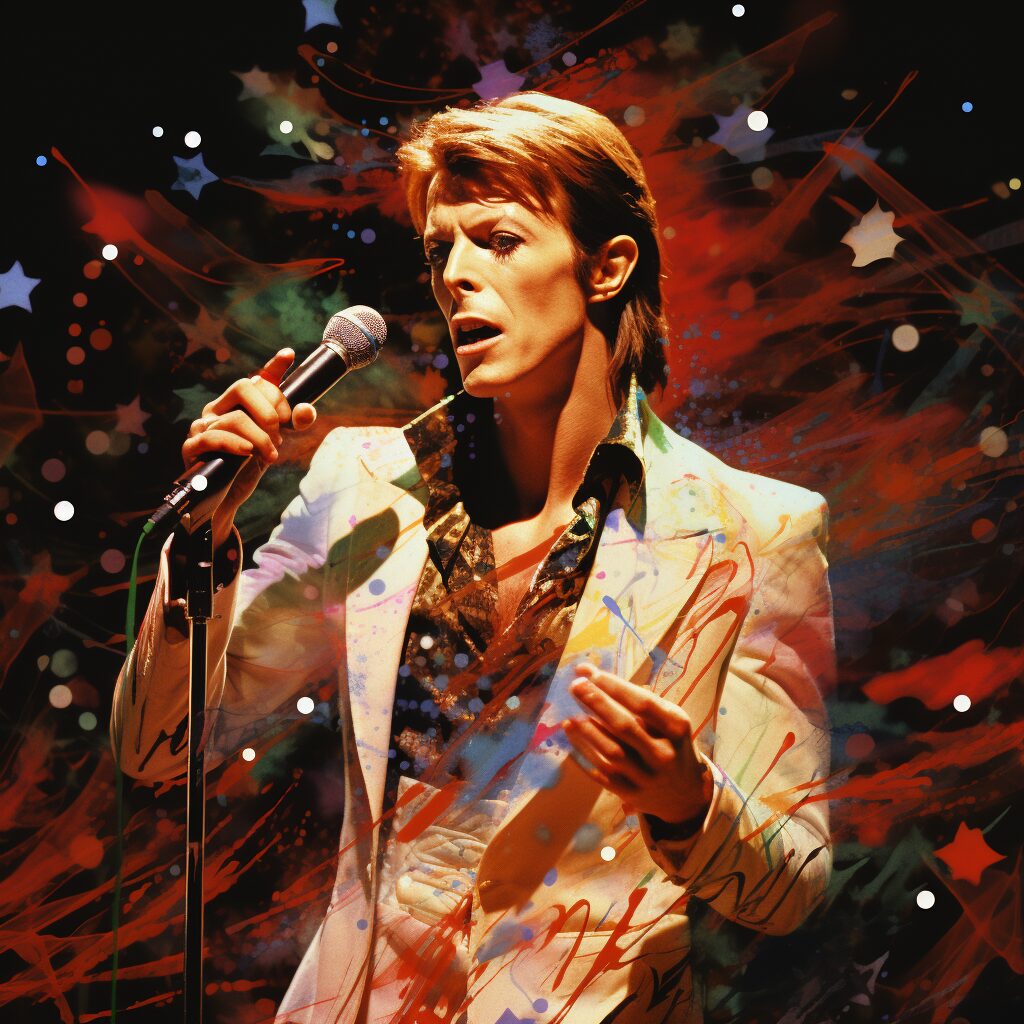 David Bowie, the composer of Life on Mars?, was not just a musician but a visionary whose career spanned over five decades. With an eclectic mix of rock, electronic, and experimental music, Bowie’s style was ever-evolving, making him a chameleon in the music world. His journey began in the London music scene of the 1960s, but it wasn’t until the 1970s that Bowie truly found his voice, both as a singer and a composer.
David Bowie, the composer of Life on Mars?, was not just a musician but a visionary whose career spanned over five decades. With an eclectic mix of rock, electronic, and experimental music, Bowie’s style was ever-evolving, making him a chameleon in the music world. His journey began in the London music scene of the 1960s, but it wasn’t until the 1970s that Bowie truly found his voice, both as a singer and a composer.
Bowie’s musical style was influenced by a wide range of genres and artists, from the rock and roll of the 50s to the mod scene of the 60s, and later, the avant-garde and glam rock movements. He was known for his ability to absorb and reinterpret these influences into something entirely new and original. Bowie’s collaborations were as varied as his style, working with everyone from Iggy Pop and Lou Reed to Brian Eno and Queen, showcasing his ability to merge his unique vision with the talents of others.
In creating Life on Mars?, Bowie’s role was pivotal. He composed the music and wrote the lyrics, crafting a song that was both a critique and a celebration of popular culture. His use of complex chord progressions and a sweeping melody line created a sound that was both grandiose and intimate. Bowie’s signature compositional techniques—such as shifting from major to minor keys and incorporating unexpected musical turns—gave the song its unique character.
The interplay between lyrics and music in Life on Mars? is a testament to Bowie’s genius as a composer. The dramatic musical shifts complement the song’s narrative, with each chord change underscoring the emotional weight of the lyrics. This song, like much of Bowie’s work, challenged the conventions of pop music, blurring the lines between different genres and artistic disciplines.
Life on Mars? stands as a testament to Bowie’s impact on the music industry. Critics and peers alike lauded the song for its innovative structure and emotional depth. Within Bowie’s discography, Life on Mars? is often highlighted as a turning point, showcasing his growth as a composer and his willingness to experiment with new sounds and ideas.
Bowie’s reflections on the song, as captured in interviews and documentaries, reveal a composer who was both introspective and daring, always seeking to push the boundaries of what music could be. His legacy is defined not just by the songs he wrote but by his influence on generations of musicians and artists who saw in Bowie a model for artistic evolution and reinvention.
Unveiling the Album – ‘Hunky Dory’
Explore the groundbreaking album ‘Hunky Dory,’ the musical backdrop that introduced ‘Life on Mars?’ to the world. Delve into the album’s diverse musical styles, critical acclaim, and lasting impact on the music industry. Discover how this iconic album paved the way for Bowie’s legendary career and inspired future generations of artists.
 “Hunky Dory,” the iconic album that introduced “Life on Mars?” to the world, is a masterpiece that stands as a testament to David Bowie’s artistic brilliance. Released in December 1971, this album marked a pivotal moment in Bowie’s career, setting the stage for his transformation into a musical legend.
“Hunky Dory,” the iconic album that introduced “Life on Mars?” to the world, is a masterpiece that stands as a testament to David Bowie’s artistic brilliance. Released in December 1971, this album marked a pivotal moment in Bowie’s career, setting the stage for his transformation into a musical legend.
“Hunky Dory” received critical acclaim and showcased Bowie’s evolving songwriting abilities. The album is a captivating blend of various musical styles, featuring tracks that span from folk-inspired ballads to glam rock anthems. Bowie’s lyrical prowess shines throughout, as he weaves intricate narratives and explores profound themes.
One of the notable aspects of “Hunky Dory” is its commercial success. While it didn’t achieve chart-topping status upon its release, it has since become a revered classic. The album resonated with audiences who appreciated Bowie’s genre-blurring approach and his thought-provoking lyrics.
Among the standout tracks on the album, “Life on Mars?” emerged as an enigmatic masterpiece that continues to enchant listeners with its haunting melody and surreal lyrics. The song’s inclusion on “Hunky Dory” contributed significantly to the album’s enduring legacy.
“Hunky Dory” didn’t just influence Bowie’s career; it also left a profound impact on the music industry and inspired countless artists across generations. Bowie’s willingness to experiment with diverse musical genres and his ability to craft compelling narratives set a precedent for future musicians.
As for sales numbers, “Hunky Dory” didn’t initially achieve astronomical commercial success but has steadily gained recognition over the years. Its enduring popularity is a testament to the album’s timeless appeal and Bowie’s lasting influence.
Beyond the Stars: Bowie’s Enduring Legacy
Reflect on the monumental impact of “Life on Mars?” and David Bowie’s legacy as an artist. Delve into how this iconic song captures the essence of Bowie’s innovative spirit and continues to inspire and resonate with audiences around the world.
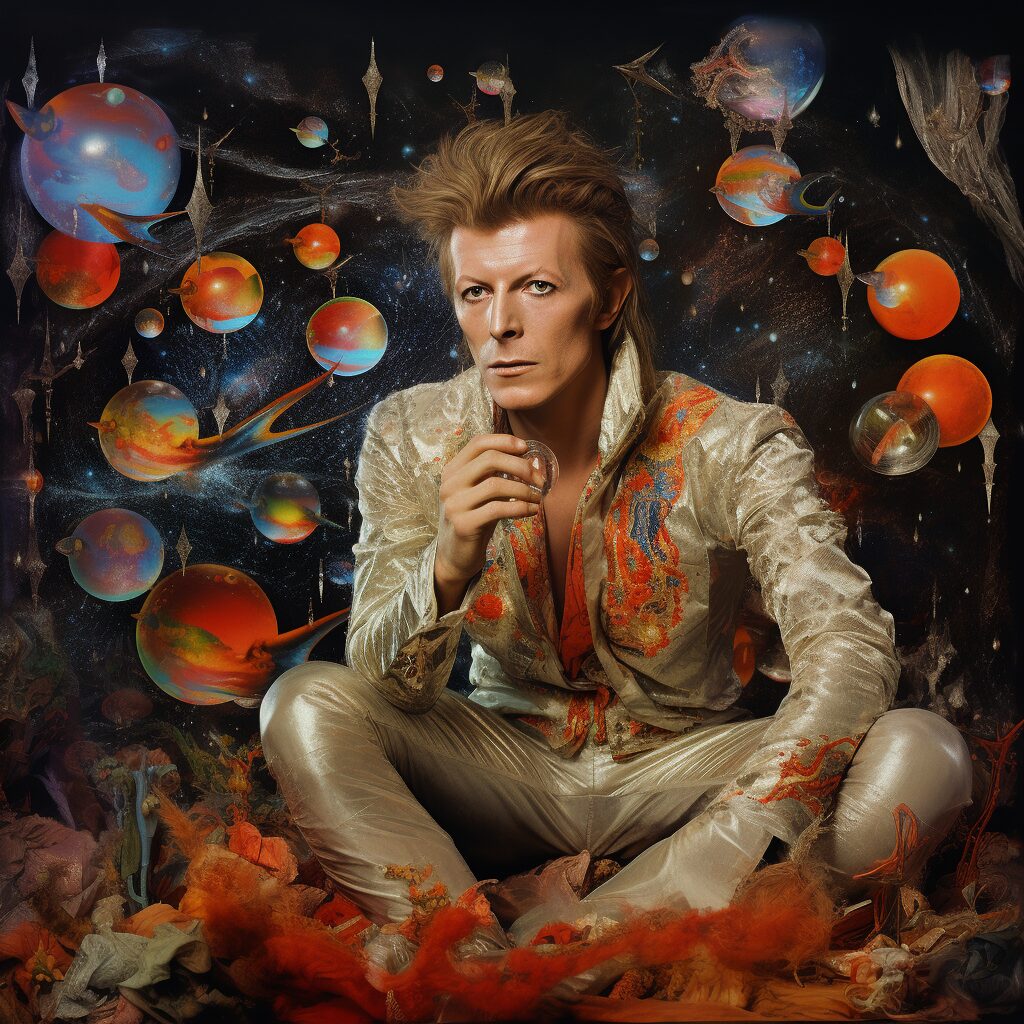 “Life on Mars?” is not just a song; it’s a cultural landmark that encapsulates the essence of David Bowie’s artistry. Its intricate composition, profound lyrics, and Bowie’s unparalleled performance coalesce into a piece that transcends time and genre. This song exemplifies Bowie’s ability to meld complex musical ideas with deeply resonant themes, creating a work that speaks to the human experience in its myriad forms.
“Life on Mars?” is not just a song; it’s a cultural landmark that encapsulates the essence of David Bowie’s artistry. Its intricate composition, profound lyrics, and Bowie’s unparalleled performance coalesce into a piece that transcends time and genre. This song exemplifies Bowie’s ability to meld complex musical ideas with deeply resonant themes, creating a work that speaks to the human experience in its myriad forms.
Bowie’s “Life on Mars?” is a testament to his genius as a composer and an artist. The song’s enduring popularity and critical acclaim reflect its profound impact on listeners and its significant place in Bowie’s oeuvre. It stands as a shining example of his innovative approach to music, blending various influences to create something truly unique. Bowie’s exploration of themes such as alienation, escapism, and the surreal nature of reality, set against the backdrop of his distinctive musical landscape, has left an indelible mark on the world of music and culture.
The legacy of “Life on Mars?” extends beyond its chart success and critical accolades. It continues to inspire new generations of musicians and artists, drawn to its emotional depth and musical complexity. Bowie’s work, particularly this song, serves as a beacon for those who seek to push the boundaries of their art, encouraging experimentation and the pursuit of one’s vision against the odds.
As we reflect on “Life on Mars?” and its place in the tapestry of popular music, it’s clear that Bowie’s work is more than just a collection of songs. It’s a narrative of artistic evolution, a series of bold experiments that challenged and reshaped the musical landscape. Bowie’s journey, with its highs and lows, its moments of clarity and confusion, mirrors our own search for meaning in a world that often feels as surreal and disjointed as the lyrics of his most famous song.
In conclusion, “Life on Mars?” stands as a powerful reminder of Bowie’s musical genius and his ability to connect with the core of our shared human experience. It is a song that continues to resonate, offering new layers of meaning with each listen. As we look to the stars, we find not just a question of life on another planet, but a reflection of our own lives, our dreams, and our endless capacity for wonder.
🌟 From the glam rock highs of Ziggy Stardust to the cinematic escapades of a girl with mousy hair, David Bowie’s Life on Mars? is more than just a song—it’s a cultural odyssey. A masterpiece that transcends time, inspiring covers from Barbra Streisand to Nine Inch Nails, and even igniting the imagination of TV series. 🚀✨ Dive into the surreal, embrace the legacy. #DavidBowie #LifeOnMars #MusicIcon

